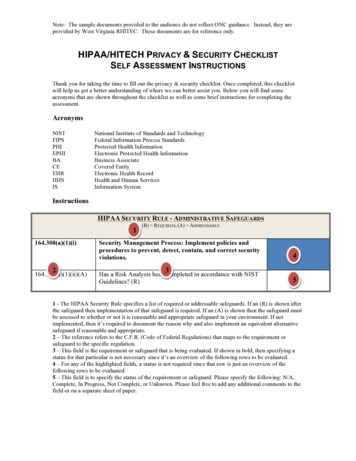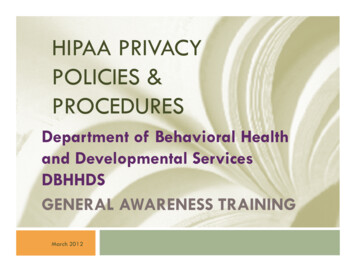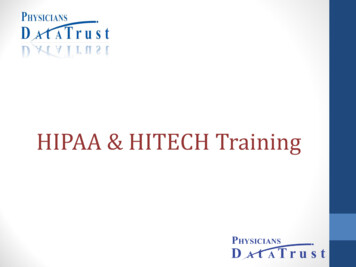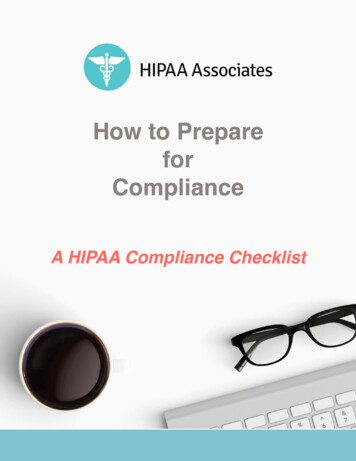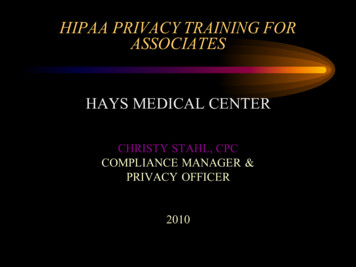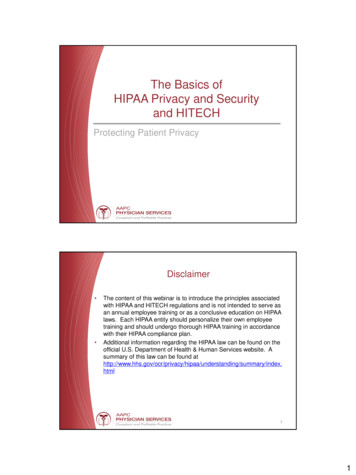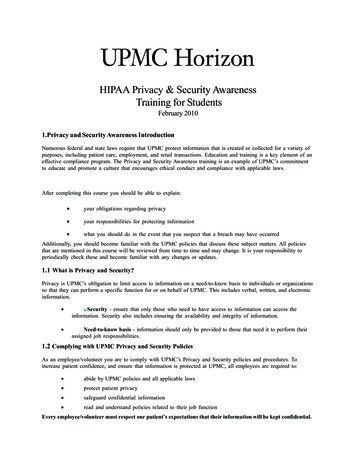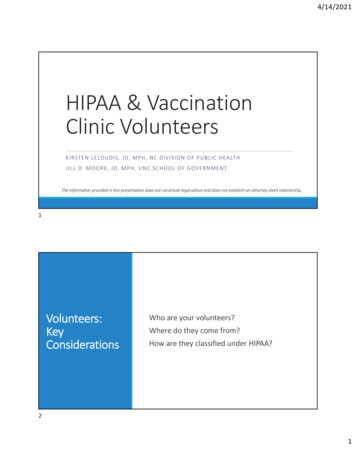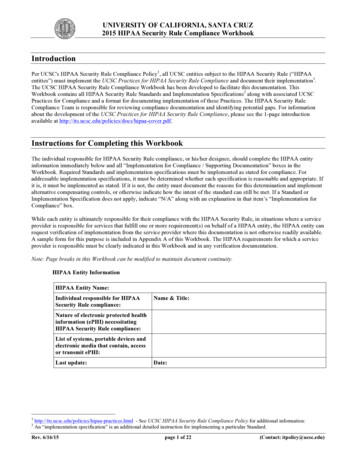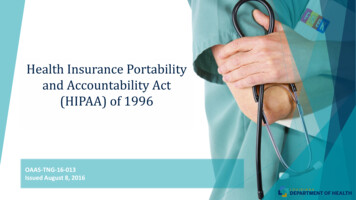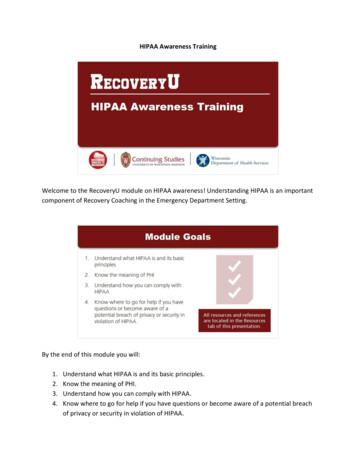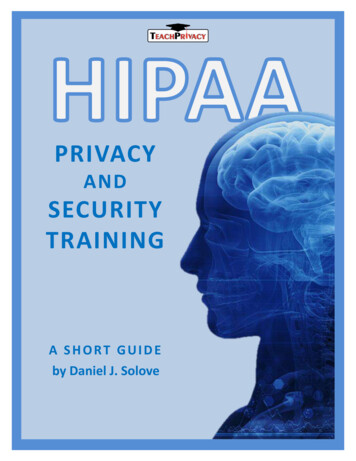
Transcription
PRIVACYANDSECURITYTRAININGA SHORT GUIDEby Daniel J. Solove
HIPAA PRIVACY SECURITY TRAINING FAQIntroductionHIPAA has extensive training requirements, and they are often a source of manyquestions and confusion. To whom do they apply? What topics must be covered? Howoften must people be trained?HIPAA only provides some of the answers to the questions above, and it leaves a lotunanswered. To complicate matters, HIPAA’s Privacy Rule and HIPAA’s Security Rule bothhave separate training requirements. See HIPAA Privacy Rule, 45 CFR § 164.530(b)(1);HIPAA Security Rule, 45 CFR § 164.308(a)(5).I will walk through the HIPAA training requirements and explain what is required andwhat isn’t. I will also provide information about what many institutions do for HIPAAtraining and my thoughts about best practices.What types of organizations must provide HIPAA training?HIPAA requires that covered entities (CEs) and business associates (BAs) provide HIPAAtraining to members of their workforce who handle protected health information (PHI). Thismeans administrative and clinical personnel need to be trained. Business associates — andany of their subcontractors — must have training. Basically,anyone who comes into contact with PHI must be trained.How long must the training be?HIPAA doesn’t specify any particular length for the training. A common mistake in trainingprograms is that they are often too long and bombard people with information they don’tneed. Very long training programs — ones that go on for 2 hours — often backfire andresult in people remembering less.I recommend that training be anywhere from 20 to 40 minutes for privacy and 20 to 40minutes for security. What matters more than time is the content of the training and howeffectively and memorably the information is taught.What topics must HIPAA privacy training cover?The HIPAA Privacy Rule says that training must be “as necessary and appropriate for the members of theworkforce to carry out their functions.” HIPAA thus doesn’t require that everyone be trained in the sameway. The Privacy Rule doesn’t provide much further guidance on the specific topics that should be covered.www.teachprivacy.com2
HIPAA PRIVACY SECURITY TRAINING FAQ3Many employees may have functions with only a limited involvement with patients or PHI. If an employee is notinvolved in providing notice to patients or in providing patients with access to their records, they don’t needtraining on these topics.Common and important HIPAA privacy topics to train about include: identifying PHI the minimum necessary rule the rules about when and how PHI may be disclosed the importance of confidentiality avoiding snooping (even when one has access to PHI) the need to keep an accounting of disclosures.Patient rights and authorization are important topics for many employeesat CEs, but employees at BAs will rarely need to know these topics. Basicinformation about BA obligations isimportant for employees at BAs.And training should also discuss the consequences of failing to follow the HIPAAPrivacy Rule — how people can be victimized by medical identity theft, how people can lose trust,how organizations can be penalized by HHS and other regulators for violations, and how employees canbe penalized too — by their organizations, by civil and criminal penalties under HIPAA, and by state law.What topics must HIPAA security training cover?The HIPAA Security Rule requires organizations to “Implement a security awareness and training program for allmembers of its workforce (including management).”Organizations must implement: (1) “periodic security updates,”(2) “procedures for guarding against, detecting, and reporting malicioussoftware,” (3) procedures for monitoring login-attempts and reportingdiscrepancies,” and (4) “procedures for creating, changing, andsafeguarding passwords.”HIPAA only specifies a few topics that need to be covered, whichinclude malicious software, authentication, and passwords. I believethat a lot more is needed. People need to understand broadly thatthey play a big role in data security. People need to learn about socialengineering, including phishing, the dangers from websites and emailattachments, the use of portable devices, and what to do when something seems suspicious.The HIPAA Privacy rule also contains security protections for regular PHI (the Security Rule only applies toe-PHI). I think it is important to discuss security for physical records too, including proper document retentionand destruction.What else should HIPAA training cover?Training should motivate, not just educate. It isn’t effective to just throw a bunch of do’s and don’ts atemployees. They need to understand why the rules matter.People should be taught that good privacy and security practices can help them personally too. These are thingsthat can protect themselves and their families from harm.www.teachprivacy.com
HIPAA PRIVACY SECURITY TRAINING FAQ4It is also important to point out that HIPAA isn’t the only regulation that must be followed. Inmany cases, there are state laws that are stricter than HIPAA, and HIPAA does not preemptmore protective state law. So employees must know that they need to pay attention to statelaw where relevant.Among the most important things that HIPAA training should cover are: (1) contact theprivacy or security officers with any questions or concerns; (2) report anything suspicious orany possible violation immediately. The more people ask and the sooner they reporttroublesome things, the better.How much should people be told about HIPAA?A lot of training spends a lot of time talking about HIPAA. It goes into along discussion of the history of HIPAA’s passage and development. Itquotes specific HIPAA language and provisions. In my opinion, this stuffis not necessary and is often a waste of people’s time to cover. It isinteresting to HIPAA lawyers, but most people would rather watch paintdry or be poked by hot needles.HIPAA itself states that the training is actually not about HIPAA butan organization’s “policies and procedures with respect to protectedhealth information.” Of course, these policies and procedures arebased on HIPAA, so the HIPAA rules must be covered. But HIPAAdoesn’t require that people becomeexperts on HIPAA. Instead, it requires that people understand whatthey are supposed to do and what they are notsupposed to do.To the extent that policies and procedures diverge from HIPAA (perhaps because of stricter state lawrequirements, or due to special additional requirements in certain contracts, or due to an organization’s ownpractices which might be stricter than HIPAA), employees should be trained about these divergences. Employeesshould be provided with an organization’s policies and procedures.How role-based should training be?I have seen effective programs that are highly role-based as well as onesthat are more general. For all employees, there is a basic body of commoninformation. For example: understand what PHI is, maintain confidentiality,don’t snoop, use the minimum necessary amount of information, askquestions when in doubt, report anything suspicious, etc. Information forspecific roles can then be added on. Keep in mind that as training becomesmore role-based it also becomes more challenging to administer.An approach that has worked well at many organizations is a hub-andspokes approach — a common course (the hub) with the key informationthat everyone should know and then spokes for various specific roles. Whatmatters most is the overarching goal: People must know what they aresupposed to do to protect PHI in their jobs.www.teachprivacy.com
HIPAA PRIVACY SECURITY TRAINING FAQ5Why should HIPAA training do more than just convey rules?Far too often, training is so focused on saying the right things that it fails toget employees to do the right things.Training must be understood. Information is worthless unless peopleunderstand it.Training must be remembered. If people don’t remember the training,then what’s the point?Training must be followed. Many incidents aren’t due to ignorance; they are due to people just not caringenough about doing the right thing. People are busy; things are hectic; and following HIPAA can be inconvenientand cumbersome at times. Training must make people care.How often must HIPAA training be given?The HIPAA Privacy Rule states that training must be provided to “each new member of the workforce within areasonable period of time after the person joins the covered entity’s workforce” and to “each member of thecovered entity’s workforce whose functions are affected by a material change in the policies or procedures . . .within a reasonable period of time after the material change becomes effective.”In practice, most organizations train all employees annually on HIPAA, and I strongly believe that this is the bestpractice. Memories fade quickly. Policies change and then the fact that these changes were made getforgotten. People need to be constantly reminded of what they must do because all it takes is one lapse andthere will be an incident.The HIPAA Security Rule requires periodic security updates. The Security Rule doesn’t define what “periodic”means. Nor does it define what the periodic security updates must consist of. The periodic updates can focus ona particular topic and they can be a module, a video, an email newsletter, a flyer, or anything else. I believe thatshort memorable messages spread out across the year can be immensely effective.What are the consequences for inadequate HIPAA training?There can be severe consequences:First, HHS can issue a penalty of up to 1.5 million per provision of HIPAA violated. Inadequate training is lowhanging fruit to OCR. The bottom line: Inadequate training bigger fine!Second, state attorneys general can enforce HIPAA too. Some state laws requiretraining in HIPAA — you can be fined under Texas law up to 1.5 million for failingto follow HIPAA’s training requirement!Third, because most privacy and security incidents involve human mistakes,training can reduce the risk of having such incidents.Fourth, inadequate training can be flagged in a HIPAA audit if an organization isaudited.www.teachprivacy.com
About the AuthorProfessor Daniel J. Solove is the John Marshall Harlan Research Professor ofLaw at the George Washington University Law School. One of the world'sleading experts in privacy law, Solove has taught privacy and security lawsince 2000, has published 10 books and 50 articles, including the leadingtextbook on privacy law and a short guidebook on the subject.Professor Solove has spoken at hundreds of universities, federal agencies, and other organizations. Hehas given keynote addresses at many conferences, including one organized by the U.S. Department ofHealth and Human Services.His LinkedIn blog has more than 1 million les/2259773Professor Solove organizes many events per year, including the Privacy Security Forumevents, held in Washington DC in the spring and fall.About TeachPrivacyTeachPrivacy was founded by Professor Daniel J. Solove. He is deeply involved in the creation of alltraining programs because he believes that training works best when made by subject-matter expertsand by people with extensive teaching experience.TeachPrivacy has a library of nearly 100 training courses that cover a wide array of privacy and securitytopics including HIPAA, FERPA, PCI, phishing, social engineering, and many others.www.teachprivacy.com
training in HIPAA —you can be fined under Texas law up to 1.5 million for failing to follow HIPAA's training requirement! Third, because most privacy and security incidents involve human mistakes, training can reduce the risk of having such incidents. Fourth, inadequate training can be flagged in a HIPAA audit if an organization is audited.
